Switzerland’s federal government appears poised to crack down on money laundering in the wake of banking scandals and investigations linked to FIFA chiefs and Vladimir Putin’s favorite cellist among others. After the International Consortium of Investigative Journalists 2016 Panama Papers investigation, the inter-governmental Financial Action Task Force (FATF) called on the Swiss, known for bank secrecy, to do more to thwart financial crime.
On June 1, the federal government proposed three key changes to the Anti-Money Laundering Act, including stricter fiduciary obligations for those involved in creating, managing or maintaining companies and trusts; disclosure of beneficial ownership; and establishment of a commercial register.
(…)
Under the proposed changes to be weighed for four months before being deliberated upon by Parliament, lawyers and others would be required to do due diligence to ascertain whether clients represent a risk for bribery or other wrongdoing, something that hasn’t previously been required.
“The main point is that the government has now sided with FATF and journalists in saying this loophole has to be closed,” said ICIJ member Oliver Zihlman, who writes for SonntagsZeitung and Le Matin Dimanche.
Obtained payments from other companies
ICIJ and its media partners, including Zihlman, exposed records listing Sergei Roldugin, a classical cellist and long-time friend of Russian President Vladimir Putin, as the owner of offshore companies that have obtained payments from other companies worth tens of millions of dollars.
It also found bank accounts linked to major figures in FIFA, the international governing body of soccer.
ICIJ and its media partners found that FIFA’s ethics head Juan Pedro Damiani and his law firm had done work for offshore companies linked to Eugenio Figueredo, a former FIFA vice president who has been charged by U.S. authorities with wire fraud and money laundering, as well as to Hugo and Mariano Jinkis, a father-son team of businessmen accused of offering bribes to gain broadcast rights to FIFA events in Latin America.
Testified before the European Parliament
Zihlman had testified before the European Parliament that “90 percent of Swiss lawyers” used the loophole that they were not required to do due diligence when incorporating companies with the now-closed Panamanian law Mossack Fonseca, whose files provided basis for the Panama Papers investigation.
The changes proposed by the Swiss government also include requiring those involved in setting up companies to verify who actually owns them and to regularly check that client information is up to date. Still another proposal is to require associations, especially those “mainly involved in collecting or distributing assets abroad” to be listed in the commercial registry.
Jean Claude Bastos, a key figure in the Paradise Papers, has close connections to Angola’s former leaders – and worked closely with global accounting giant KPMHG.
By Martha M. Hamilton and Will Fitzgibbon
Source: https://www.icij.org/



